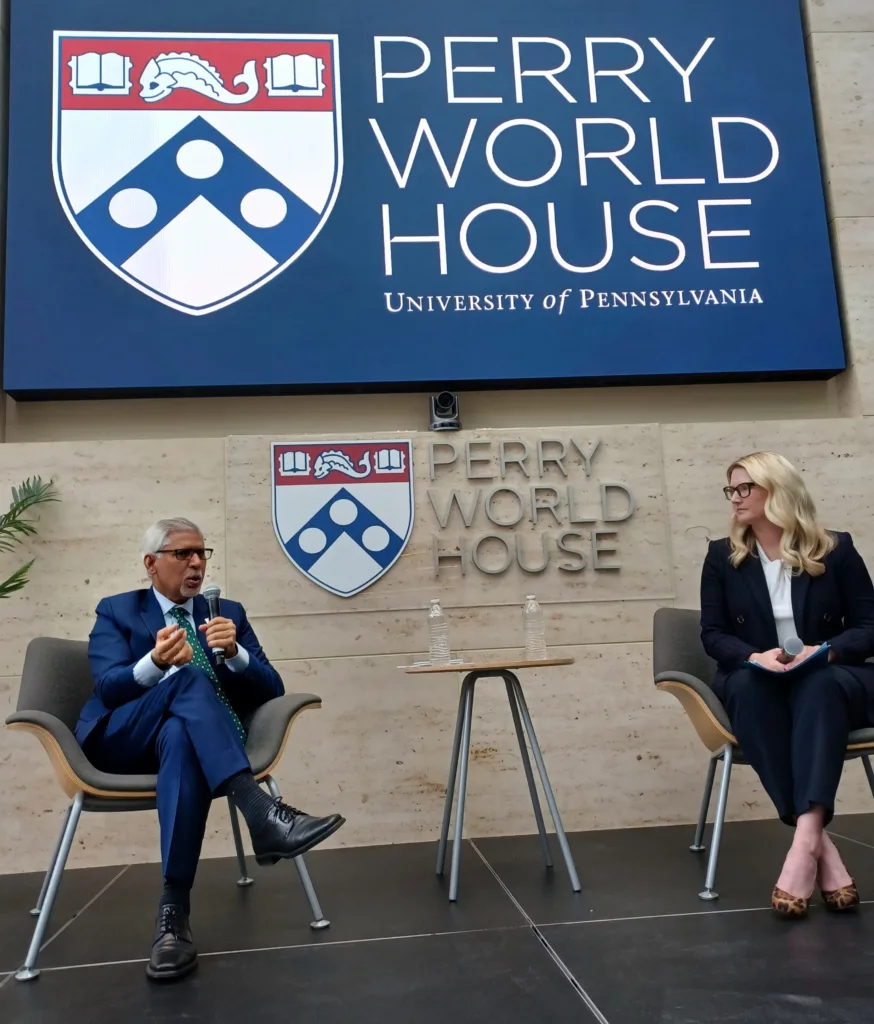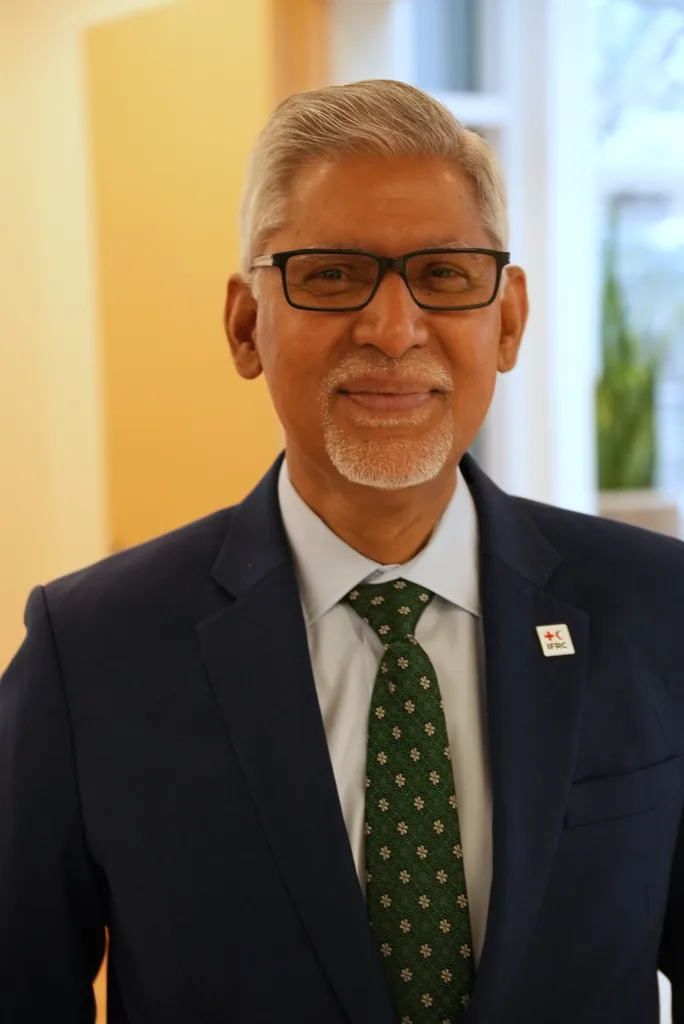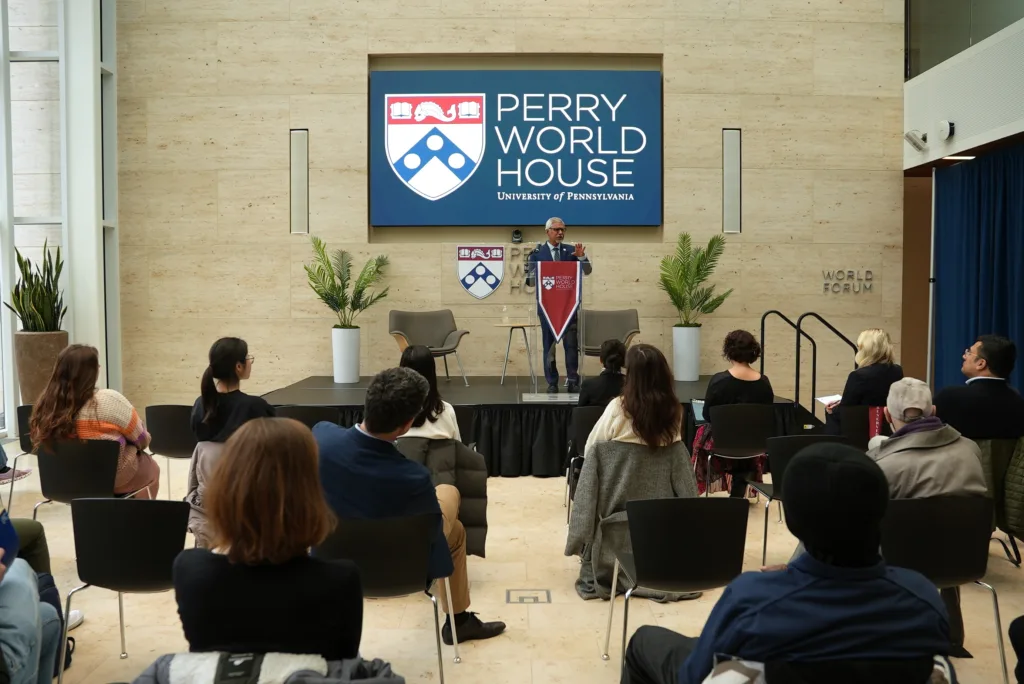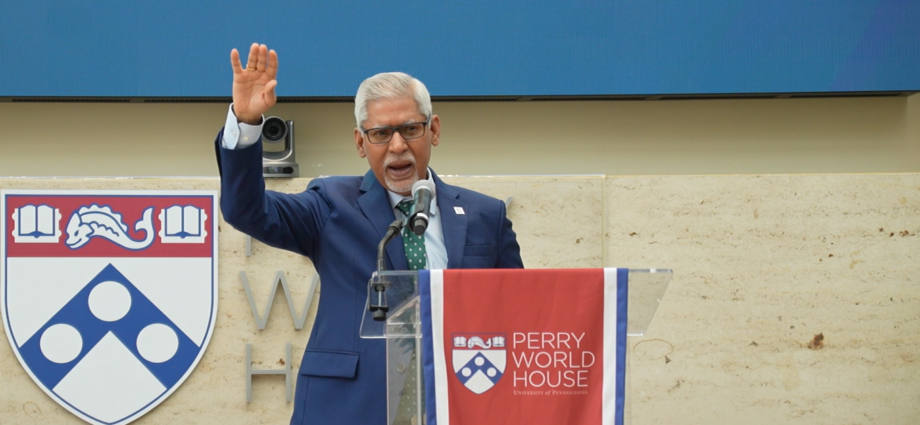On Wednesday, March 27, Perry World House hosted a crucial event centered around addressing long-standing humanitarian emergencies termed “Forgotten Crises.” The keynote speaker for this enlightening discourse was Jagan Chapagain, the Secretary-General of the International Federation of Red Cross and Red Crescent Societies (IFRC). Against the backdrop of escalating global crises and dwindling support, the event aimed to explore innovative strategies to sustainably assist populations grappling with these overlooked emergencies.

According to the United Nations Office for the Coordination of Humanitarian Affairs(OCHA) ” in 2024, nearly 300 million people around the world will need humanitarian assistance and protection, due to conflicts, climate emergencies and other drivers. In the coming year, 74.1 million people will need humanitarian assistance in East and Southern Africa.”
However, the global humanitarian landscape is witnessing a distressing trend wherein humanitarian organizations grapple with mounting challenges in providing aid to populations in dire need. Forgotten Crises epitomized this dilemma, encompassing a spectrum of protracted emergencies such as acute food insecurity, cholera outbreaks, and security-related crises in regions like Africa, Sudan, Yemen, and Afghanistan.
Despite their severity, these crises often languish in the shadows of international attention, resulting in inadequate funding and support.
When Chapagain visited Oslo in Norway, there were a discussion with students and got a poignant question from a 13-year-old student asking, “Why is it that when people are impacted by large crises, they receive all the attention and abundant support, but when people are affected by smaller crises that go unnoticed, they don’t receive any support or attention? Why is that?” ” It resonated deeply with Jagan highlighting the disparity in attention and support between large-scale crises and smaller, overlooked ones.
“The 13-year-old boy’s question shook my concerns deeply. I found myself unable to provide a direct answer. As the leader of one of the largest humanitarian organizations, operating in 191 countries with over 16.5 million volunteers worldwide, I struggled to address his inquiry. This incident prompted me to realize the need for our organization, as well as for me personally as a leader, to shine a spotlight on crises that often escape media attention. These are the crises not featured in the 24-hour news cycle or social media. That’s why I seize every opportunity, like this one at Perry World House, to raise awareness and discuss these vital issues”, Chapagain said.
In light of these challenges, the imperative to devise innovative approaches to address Forgotten Crises becomes paramount. At the heart of this endeavor lies the quest to bridge the funding gap and empower local communities to bolster resilience against recurring emergencies. The event at Perry World House sought to delve into this pressing issue, aiming to catalyze meaningful discussions and tangible actions.
Reflecting on a touching encounter during a visit to Zambia, where he witnessed the devastating impact of a cholera outbreak, Chapagain expressed concern over the lack of awareness and response to such crises. Despite claiming hundreds of lives, the cholera crisis in Zambia received minimal attention, exposing systemic failures in addressing preventable diseases.
“Just a few weeks ago, I visited Zambia, where the country was grappling with a devastating cholera crisis. It’s likely that many of you hadn’t heard about it because it received little to no coverage in the news. The situation was dire. The National Stadium had been transformed into a cholera treatment center. This disease, which is entirely preventable and treatable, claimed the lives of hundreds of people. Thousands more endured immense suffering. I vividly recall the scene at the stadium row upon row of beds for cholera patients, each with a hole and a bucket beneath it. The sheer magnitude of this crisis is something I can’t shake from my mind. Yet, despite the immense human suffering, it received scant attention.”
Chapagain suggests investing in additional production facilities for cholera vaccine in Africa, where cholera outbreaks are most prevalent. “I should point out that globally, there is currently no stock of cholera vaccine available, and there is only one production facility in South Korea. This raises a key question: why? Most of the cholera outbreaks occur in Africa, yet we have only one production facility in South Korea. They are making efforts to ramp up production, and our organization will be working with them. However, why are we not investing in similar facilities in Africa? Why can’t we establish one or two there? This highlights the fact that global development priorities are not always aligned correctly.”
Chapagain aims to address the imbalance in global development priorities and improve access to essential vaccines in vulnerable areas.

He emphasized the need for inclusive approaches that prioritize community empowerment and local partnerships. “I personally am a very optimistic and hopeful person. I firmly believe that all is not lost, especially when we have individuals like yourself, along with thousands and millions of people worldwide, who share that optimism and commitment. Together, as fellow human beings, we can make a difference.”
Jagan Chapagain, with his extensive background in humanitarian work, emerged as a beacon of insight and leadership at the event. As the CEO and Secretary-General of IFRC, Chapagain brings a wealth of experience garnered from his tenure at the helm of one of the world’s foremost humanitarian organizations.
As the Wolk Visiting Fellow at Perry World House this year, Chapagain’s engagement underscores the urgency of collective action in addressing Forgotten Crises. Innovating solutions for Forgotten Crises demands a concerted effort from the global community. The event at Perry World House, featuring Jagan Chapagain’s invaluable insights, served as a critical platform for fostering dialogue and forging pathways towards meaningful change.
With a background in engineering, Chapagain began his journey in humanitarian work as a youth volunteer with the Nepal Red Cross. Over the years, he has ascended through various leadership roles within the IFRC, including Chief of Staff and Regional Director for Asia Pacific.
Perry World House of University of Pennsylvania named Jagan Chapagan as its class of visiting fellow for the 2023-24 academic year. Since 2016 Perry World House, Penn’s center for global policy and engagement, has invited intellectual and industry leaders to take part in its Visitors Program.


